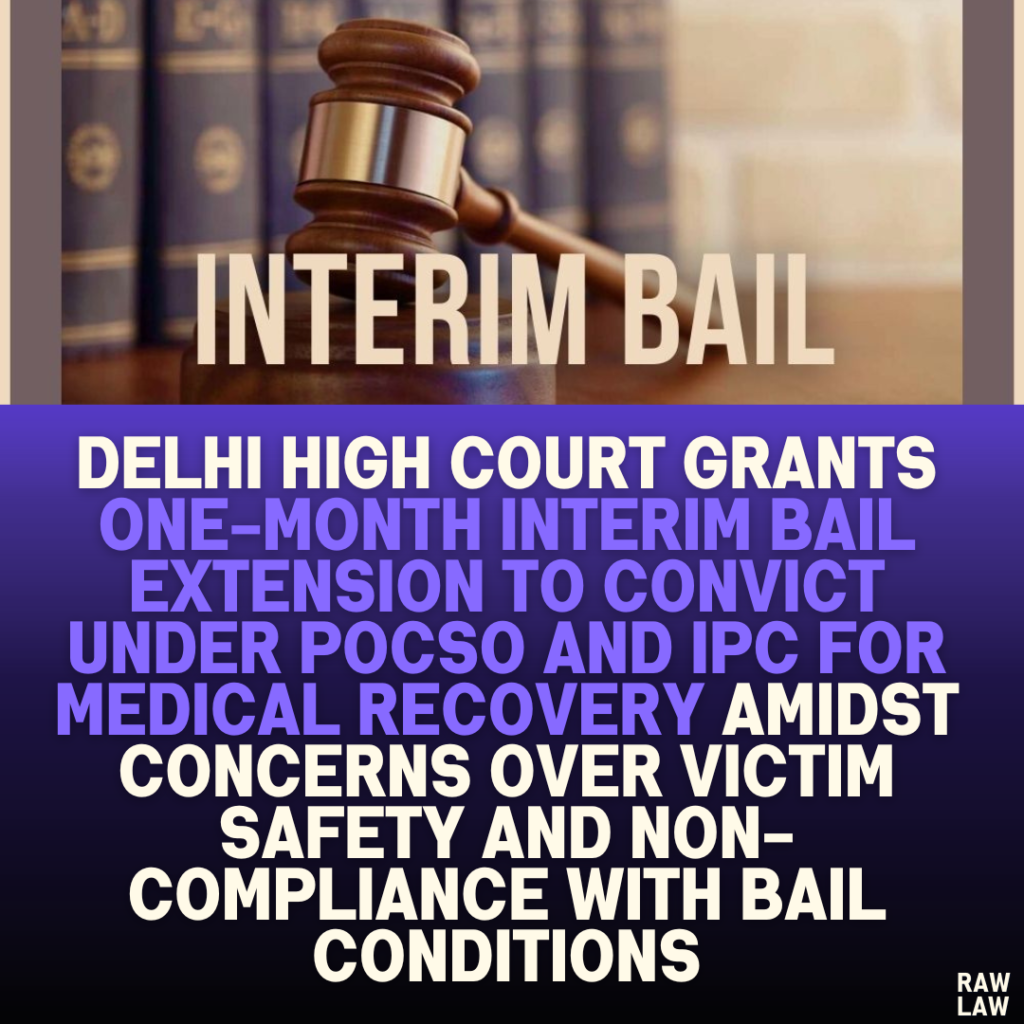Court’s Decision
The Delhi High Court extended interim bail for one month to an appellant convicted of serious offences under the Protection of Children from Sexual Offences (POCSO) Act and the Indian Penal Code (IPC). The court considered the appellant’s ongoing medical issues and treatment requirements while imposing strict conditions to ensure compliance and address safety concerns for the survivor and her family.
Facts
The appellant was convicted for rape under Sections 376, 363, and 366 of the IPC, and Sections 5(c) and 6 of the POCSO Act. The Trial Court sentenced him to life imprisonment for the remainder of his life. Additionally, the court imposed a fine of ₹25,00,000 and directed payment of ₹10,00,000 as compensation to the survivor’s mother.
The appellant initially secured interim bail citing medical conditions, including degenerative spine disease, bilateral cataracts, hemorrhoids, and anxiety. The medical board at AIIMS conducted an extensive evaluation and recommended treatment. However, given his stable condition, the court earlier directed outpatient treatment. The appellant now sought further suspension of his sentence, arguing the need for extended recovery time post-surgery and for managing other health issues.
Issues
- Whether the appellant’s medical condition justified an extended suspension of his sentence.
- Whether granting an extension posed risks to the survivor and her family.
Petitioner’s Arguments
The appellant’s counsel argued that:
- The appellant’s medical condition warranted further suspension of his sentence. AIIMS reports confirmed his ongoing need for medical care.
- Despite some improvement, the appellant required close monitoring and recovery time following eye surgery and treatment for other ailments, including internal hemorrhoids and degenerative spine disease.
- The appellant assured compliance with any conditions imposed by the court.
Respondent’s Arguments
The respondent, represented by counsel for the survivor and the Central Bureau of Investigation (CBI), opposed the plea, arguing:
- AIIMS reports indicated that the appellant’s condition was stable and manageable on an outpatient basis.
- During previous bail, concerns arose regarding the appellant’s behavior, including the high number of visitors at the hospital, which disrupted medical care and raised security concerns.
- The appellant posed a potential threat to the survivor and her family, given his history and the circumstances of the case.
Analysis of the Law
The court carefully evaluated:
- Medical reports from AIIMS and Tihar Jail, which detailed the appellant’s health issues and treatment. While his condition had improved, certain follow-ups and outpatient treatments were still required.
- Safety concerns raised by the respondents, emphasizing the need to ensure no threats to the survivor or her family.
The court relied on precedents addressing bail suspension in medical cases, balancing the appellant’s health needs with public and victim safety.
Precedent Analysis
The court referred to a prior case involving the appellant’s brother, where interim bail was denied despite medical conditions, as they did not hinder day-to-day activities. This precedent influenced the court’s decision to impose strict conditions during the extended bail period.
Court’s Reasoning
The court found:
- While the appellant’s medical conditions warranted further treatment, the circumstances did not justify a long suspension of the sentence.
- A one-month extension was adequate to allow recovery from recent eye surgery and other treatments. Strict conditions were necessary to mitigate risks to the survivor and her family.
The court underscored the importance of balancing the appellant’s rights with public safety and victim protection.
Conclusion
The court extended interim bail for one month, until January 20, 2025, with the following conditions:
- Residence Restriction: The appellant must remain at a specified address in Delhi, guarded by Delhi Police, and may not leave without court permission.
- Visitor Limitation: Only two visitors allowed at a time, and the appellant must notify the CBI officer about their details.
- CBI Oversight: A designated CBI officer will monitor the appellant’s activities daily.
- Medical Follow-Up: The appellant must attend follow-up consultations at AIIMS between January 10-15, 2025.
- Surveillance: A 24-hour police presence at the appellant’s residence.
- Compliance: The appellant must surrender to the Jail Superintendent on January 20, 2025. No further extensions would be granted.
Implications
This decision highlights the judiciary’s attempt to:
- Balance Health and Justice: Recognize and accommodate genuine medical needs while upholding the rule of law.
- Ensure Victim Safety: Prioritize the protection of the survivor and her family, particularly in cases involving high-profile or sensitive crimes.
- Impose Accountability: Lay down stringent conditions to prevent misuse of bail and ensure that justice is not compromised.
This judgment serves as a precedent for addressing bail applications on medical grounds while ensuring fairness and security for all parties involved.
